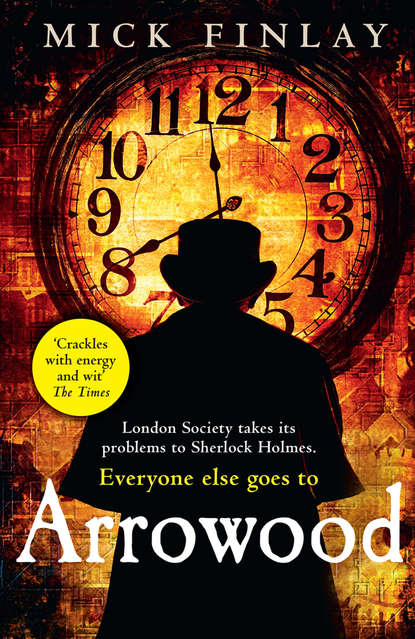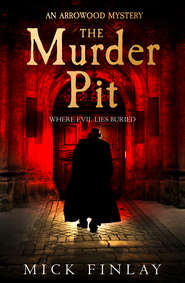По всем вопросам обращайтесь на: info@litportal.ru
(©) 2003-2024.
✖
Arrowood
Автор
Год написания книги
2019
Настройки чтения
Размер шрифта
Высота строк
Поля
Petleigh considered this for a while.
‘We’ll make enquiries. Now tell me what you know.’
The guvnor filled him in with all the facts we knew. Petleigh scribbled in a notebook as he talked, trying again and again to get the names of our client and our informants. The guvnor resisted.
‘The girl had this in her hand,’ he said, fishing the bullet from his waistcoat. ‘I believe she meant it for us.’
Petleigh held it under the lamp and inspected it. Then he placed it on the table.
‘Could be a sweetheart gave it to her. Or she might have picked it up from somewhere. I don’t think it’s important.’
‘Oh, really?’ said the guvnor. ‘Well, I suppose we must trust your judgement on that. What’s your theory then, Inspector?’
‘Oh, no, no,’ said Petleigh in a tired voice. ‘You tell us yours, Arrowood.’
The guvnor cleared his throat and sat forward.
‘The simplest story is that the French boy was involved in some business between Cream and the Fenian gang. Something went wrong and the boy either fled or was killed. Martha was murdered because she was about to give me information, which means it’s a serious business. More serious than we realized when we took the case. That’s my best guess. Now, what have you found out?’
Petleigh stood, brushing some imaginary dust from his jacket.
‘Much the same,’ he replied as he examined his sleeves. ‘Or similar.’
I couldn’t help but laugh. Petleigh’s face soured.
‘I need the names of your informants,’ he insisted.
I stepped to the grate and began to rouse the last embers of the fire. The guvnor tutted and fiddled in his pockets for matches. He said nothing.
‘You cause me much annoyance, Arrowood,’ said Petleigh at last. He placed his hat carefully on his head. ‘Leave this to the police, sir. If Cream or the Fenians chose to dispose of you, they’d smash you like a . . . like a . . .’ He stood before us, his mouth open, the weight of his warning lost in his inability to find a suitable idea. ‘Like a cow on a dumpling,’ he said at last. He turned to me. ‘That goes for you also, Norman.’
‘Also like a dumpling, Inspector?’
‘They would break you like a biscuit.’
‘Of course, sir.’
‘I’m serious!’ cried Petleigh in a fury. ‘You’re no match for them. We know Cream’s men are behind a wave of deaths in the last few years, and it sounds like we can add this girl’s murder to the list. You don’t know the half of it, Arrowood. Drownings, beatings, arson – anything you can think of. The most appalling things. They’ll kill anyone who gets in their way and they’ve people so afraid that we can’t get anyone to testify against them. I don’t have to remind you of the Spindle case, do I? You saw what they did to that man!’
The guvnor nodded.
‘Do you want that to happen to you?’ demanded Petleigh.
The guvnor sat thinking, his hands clasped on his belly, his eyes on the fire.
‘You’ll send me the name then, Petleigh?’ he asked at last.
‘Yes, I’ll send you the name,’ replied the inspector with a sigh. ‘But leave the murder of the serving girl to us. If you learn anything, you must tell me at once. Send the muffin boy with a message. Do not follow that trail yourselves. I’m warning you.’
When they’d gone and we were sitting in the warm parlour drinking another mug of ale, the guvnor let out a humourless laugh.
‘Much the same!’ he declared. ‘Much the same, Barnett! Idiot. He knows without us he’s no chance of solving this murder.’
‘What of tomorrow, sir?’
‘Tomorrow we see what the French lady is all about.’
Chapter Ten (#ulink_f36470c1-6d60-564e-8330-d6c4ea6348c1)
I didn’t sleep much that night, though I was tired enough and badly in need of rest. I couldn’t get comfortable with the bruise on my back, and my arm was burning like a little beggar. All night my thoughts went round and round, and every way they turned there were men ready to kill us. If it was up to me, we would have handed the money back as soon as Miss Cousture mentioned the Barrel of Beef, but now we had the Fenians to worry about as well. A girl had already died and I’d had a beating. There was only one way it could go: the deeper we got into this case the worse it was going to get.
As we walked down the Old Kent Road, past the people hurrying off to work, the omnibuses full to bursting, I laid it down plain:
‘We’ll most probably get ourselves killed before this case is over.’
‘Not if we’re careful,’ the guvnor replied.
From the way he spoke, I wasn’t sure he believed it himself.
‘You must be worried about the Fenians, William,’ I said.
His face darkened. Even though he argued fierce for Irish self-government, the Fenian bombing campaign we’d gone through ten years before had terrorized him. He’d covered the dynamitards for his newspaper, and sat through the trials of the Invincibles, the Mansion House bombers, the Dynamite Sunday plotters. He’d investigated the Skirmishing Fund and the Triangle and the tangled connections between Clan na Gael and Parnell. He became a changed man in those years, and it was maybe this that lost him his job in the end. Before then he was fearless, chasing up a story wherever it led. But the years of panic in the city affected him. He stopped taking milk in his tea, believing the stories of the Fenians poisoning the urns with strychnine. After the underground railway plot was discovered he wouldn’t go in the tunnels no more, and to this day he’ll only travel across town by bus. For a whole year, like so many other fearful people, he bought his water off a cart from the countryside in case they’d tainted the pumps. I’d never seen a man so badly feared from something. It was this partly as drove Isabel to run off, and it took him some years before he started to regain his old self. But some of that fear still remained, and you could see it round the edges of him sometimes, mixed in with the tantrums and the kindness and the jumble of other qualities that made up his character.
‘What do you say we get out now?’ I said. ‘Give the lady back her money. Something else’ll come up in time. As soon as Cream or the Fenians find out we’re interested, we’ll end up in the river. And now we’ve got a bent copper. How do we know anything we tell Petleigh isn’t going to get back to them?’
He was silent. No doubt he was remembering the Betsy case, when John Spindle was beaten to death by Cream’s men. It seemed a simple job when we took it on. Mrs Betsy wanted a watch on her husband, a stevedore on the docks, on account of how short his wages had got. She reckoned he was gambling, though it turned out the money was going on a second wife he was keeping down near Pickle Herring Stairs. It was a few bob’s easy work for us, we thought. A couple of days following him when he finished at the docks of an evening, then on to the next case. And it would’ve been, except for the guvnor taking a shine to Bill Betsy’s other wife, and her tricking him into helping her cousin out of some trouble he’d gotten into. It was through that we’d caused John Spindle’s death. Without knowing what we were doing we’d exposed him, then hadn’t arrived in a cab to pick him up as we said we would. We’d left him in the hands of Mr Piser and Boots, to be clubbed to death in the coal cellar of the lodging house we’d hidden him in. The guilt had lain heavy on us ever since, and so far we’d kept our promise to steer clear of jobs that could turn bad. For four years, we’d kept to that resolution, yet still the memory of the case could make us feel the most wretched men in London.
Вы ознакомились с фрагментом книги.
Приобретайте полный текст книги у нашего партнера:
Приобретайте полный текст книги у нашего партнера:






